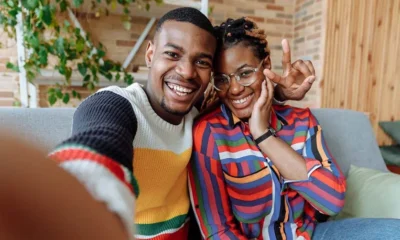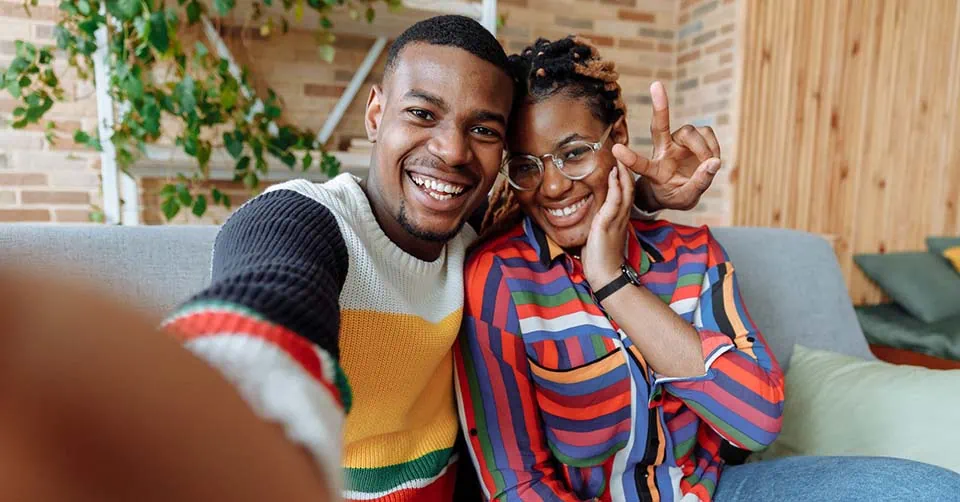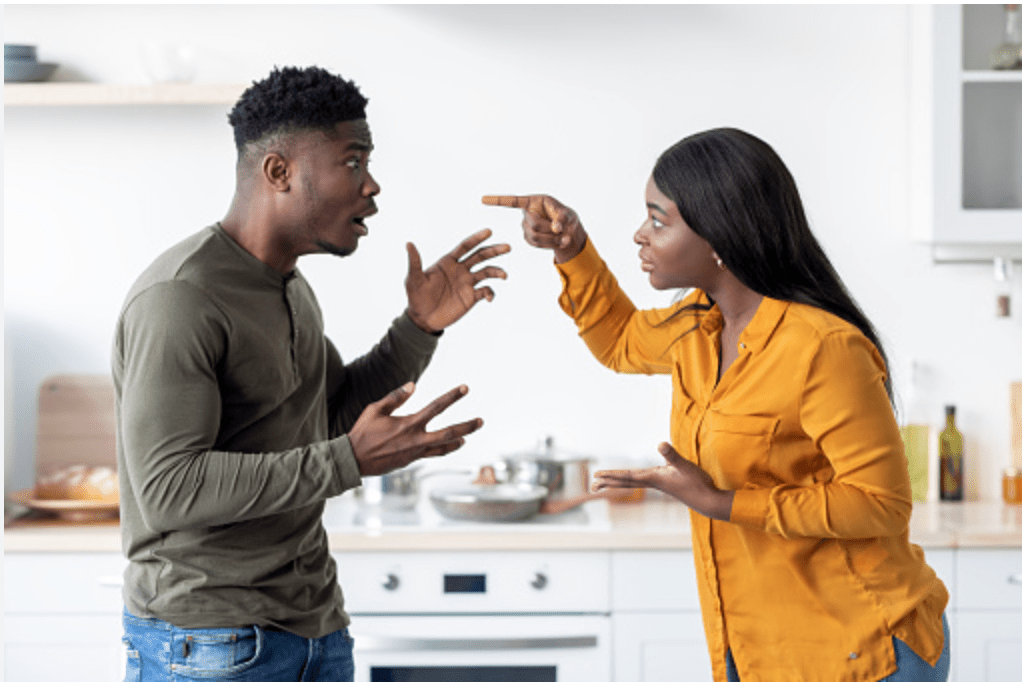OPINION
11 Dating Tips For Introverts: How To Embrace Romance With Quiet Confidence
Published
9 months agoon
By
wpadminee
For introverts, these dating tips will do the magic for you. Dating can often feel overwhelming and exhausting. The constant social interactions, small talk, and pressure to make a good impression can be daunting. However, being an introvert doesn’t mean you can’t enjoy successful and fulfilling romantic relationships.
With the right approach and mindset, introverts can thrive in the dating world. Here are some valuable dating tips to help introverts navigate the dating scene with confidence.
1. Embrace Your Introversion
The first step in successful dating as an introvert is to accept and embrace your personality. According to Psychology Today, introverts have many desirable qualities that can make them excellent partners, such as being good listeners, thoughtful, and emotionally intelligent. Rather than trying to change who you are, focus on highlighting these positive traits.
2. Choose the Right Dating Platforms
Online dating can be a great option for introverts, as it allows for more controlled and less overwhelming interactions. Platforms like eHarmony or OkCupid, which focus on in-depth profiles and personality matching, may be particularly suitable for introverts. These sites can help you connect with like-minded individuals and ease into conversations at your own pace.
3. Plan Thoughtful Dates
When planning dates, choose activities that align with your interests and comfort level. Quiet, intimate settings like coffee shops, museums, or nature walks can be ideal for introverts.
Shared experiences can help build stronger connections, so consider activities that allow for meaningful conversations and shared discoveries.
4. Practice Self-Care and Set Boundaries
Dating can be emotionally and mentally draining for introverts. It’s crucial to practice self-care and set boundaries to avoid burnout. We recommend you schedule alone time before and after dates to recharge. Don’t be afraid to communicate your needs for space and downtime to your potential partner.
5. Focus on Quality Over Quantity
Instead of trying to meet as many people as possible, focus on cultivating deeper connections with a few individuals. Introverts often thrive in one-on-one settings and prefer meaningful conversations over small talk.
Take the time to get to know someone on a deeper level rather than rushing through multiple superficial interactions.
6. Prepare Conversation Topics
To ease anxiety about potential awkward silences, prepare a few conversation topics or questions beforehand. Ask open-ended questions that encourage thoughtful responses and help you learn more about your date.
This preparation can help you feel more confident and engaged during your interactions.
:upscale()/2023/04/19/431/n/40741968/tmp_TZNcYc_a6cdde7f90e88ef8_Header_Image.png)
7. Be Authentic and Honest
Honesty is crucial in any relationship, and introverts need to be upfront about their personality and needs. If you need time alone to recharge or prefer quieter activities, communicate this to your date.
Being authentic from the start helps ensure compatibility and sets the foundation for a healthy relationship.
8. Utilize Your Listening Skills
Introverts are often excellent listeners, which is a valuable skill in dating and relationships. Use this strength to your advantage by actively listening to your date and showing genuine interest in their thoughts and experiences. T
his can help create a strong connection and make your date feel valued and understood.
9. Take It Slow
There’s no need to rush into intense social situations or commitments. Take the time to get comfortable with your date and the dating process. Introverts must pace themselves and gradually increase the intensity and frequency of social interactions as they feel more at ease.
10. Consider Dating Fellow Introverts
While opposites can attract, many introverts find it easier to connect with fellow introverts who understand their need for solitude and quieter activities.
11. Practice Mindfulness and Stress-Reduction Techniques
Dating can be anxiety-inducing for introverts. Incorporating mindfulness practices or stress-reduction techniques like deep breathing or meditation can help manage these feelings.
Remember, being an introvert is not a disadvantage in dating. Your unique qualities and perspectives can lead to deep, meaningful relationships.
By embracing your introversion and following these dating tips, you can navigate dating with confidence and find a partner who appreciates and complements the nature of introverts.
For more dating tips, check here.
You may like
-


9 Things Men Do Only For The Woman They Respect
-


Comedian Bovi Criticises Nigerian Parents For Criminalising Dating Culture
-


6 Things To Do If Your Partner Cheats And You Still Want Them
-


How To Stop Complaining In A Relationship
-


Why You Should Have Sex Often With Your Partner
-


11 Ways To Build Emotional Connection With Your Woman
LIFESTYLE
How To Avoid Billing This December
Published
4 months agoon
December 18, 2024By
wpadminee
As a Nigerian adult, you understand that December isn’t merely a festive season—it’s the ultimate billing battlefield. In this case, knowing how to avoid billing this December can be your financial lifeline.
The month transforms into an elaborate financial obstacle course where every social engagement becomes a potential wallet-draining experience.
Picture this: you’re suddenly expected to match expensive aso-ebi for your partner’s distant cousin’s wedding, shell out cash for elaborate office hangout festivities, purchase thoughtful gifts for an extensive network of friends and family, grab concert tickets for the hottest “detty December” events, and somehow maintain some semblance of financial sanity.
Each commitment is strategically designed to empty your bank account, with Sapa waiting eagerly in the wings to completely demolish your January savings.
The universe seems to have conspired with social expectations to orchestrate a complex financial challenge, transforming December into an unofficial billing Olympics where your wallet is the primary competitor.
But here’s the good news: you can become a strategic “shege survivor” by mastering how to avoid billing this December with calculated precision and smart financial manoeuvres.
In this comprehensive survival guide, we’ll explore tactical approaches to navigate the treacherous December spending landscape, ensuring you emerge victorious without sacrificing your financial stability or social reputation. Prepare to become the ultimate December financial ninja!
1. Always Complain Like It’s Your Birthright
Nobody wants to bill someone who complains every five minutes. If you consistently make a point of complaining about your financial situation whenever you get the chance, the likelihood of being asked for money will drop drastically.
The only exception is if you have people around you who are heartless and completely audacious—if that’s the case, there’s a solution in step two.
2. Trade Your Flashy Phone for a ‘Torchlight’
Do you see that iPhone 14 Pro Max of yours? That big phone that attracts unnecessary attention? It’s essentially a billboard screaming, “I’m open for billing!”
To avoid billing, sell it and invest the money in preparing for next year’s challenges. No one will suspect you of being a “billionaire in transit” if you’re using a humble Nokia torchlight or an old-school TECNO phone.
Picture this: someone asking you for money while you’re holding a phone that looks like it belongs in 2003. They might even feel sorry for you and give you some spare change.
The goal here is to avoid billing by making it clear you’re not the person with deep pockets.
3. Buy Okrika Clothes
As the saying goes at the “Okrika” stores, “na mumu dey go boutique.” Avoid billing by steering clear of designer clothes that scream wealth and immediately mark you as a target for requests.
Instead, buy “Okrika” (secondhand) clothes and proudly share how much you paid when people compliment you. Tell them, “You won’t believe how much this outfit cost; it was just 500 Naira!” and make sure to add, “I’m making do with the little I have…”
This strategy helps position you as the king or queen of thrift, ensuring that nobody dares to ask you for money or extravagant contributions.
4. Avoid Calls Like a Pro
Screen all your calls, and be strategic about who you answer. The call from your cousin in the village? We both know it’s not “Merry Christmas” they’re about to say—it’s more likely “I need money for the New Year.”
To avoid billing, activate your Do Not Disturb (DND) mode and only return calls from people who won’t ask for a handout.
If you must respond, use WhatsApp messages so you can carefully craft your excuses without feeling pressured.
5. Go Solo: Break Up With Your Partner
Let’s be real—being in a relationship is one of the major sources of billing in December. To avoid billing and enjoy some peace of mind, consider going solo this season.
Enjoy your money without worrying about shared expenses, and enter the New Year without emotional or financial baggage. You deserve it!
When you want to avoid billing in December, it isn’t just about saving money—it’s about preserving your sanity and entering January without the financial hangover.
These strategies will help you avoid billing and ensure a peaceful, financially secure holiday season. When you’re sipping zobo in the comfort of your home instead of crying over debt recovery meetings, remember to thank me.
If you found these tips helpful and want more, visit here. And remember not to fall in love this December!
OPINION
11 Ways To Build Emotional Connection With Your Woman
Published
5 months agoon
December 1, 2024By
wpadminee
Building a deep emotional connection is crucial for lasting romantic relationships. Understanding how to build an emotional connection with a woman requires genuine effort, empathy, and consistent communication.
Building a strong emotional connection with your woman is more than just physical attraction or shared interests. Emotional intimacy is the glue that holds couples together.
Here are eleven practical ways to foster this deep connection:
1. Prioritise Quality Time
How to build emotional connection with a woman? One of the most effective ways is to prioritise quality time together. This means putting away distractions like phones and focusing on each other.
Engage in activities you both enjoy, whether it’s a shared hobby, a simple conversation, or a romantic dinner. These moments create lasting memories and strengthen your bond.

2. Active Listening
To truly understand your woman, you must listen actively. This involves paying full attention, asking clarifying questions, and reflecting on her feelings. Active listening goes beyond merely hearing words.
Avoid interrupting or formulating your response while she’s speaking. When learning how to build emotional connection with a woman, focus entirely on her when she speaks. Show that you value her thoughts and emotions.
Maintain eye contact. Put away digital devices. Avoid interrupting. Reflect back on what you’ve heard to demonstrate understanding. Show genuine interest in her experiences.
Ask follow-up questions that reveal you’re truly engaged. Validate her feelings without judgment. This approach creates a safe emotional space where she feels heard and respected.
3. Express Gratitude and Appreciation
Show your appreciation for your woman through words and actions. A simple “thank you” or a heartfelt compliment can go a long way.
Recognise her efforts, both big and small, and express gratitude for her presence in your life. This positive reinforcement strengthens your emotional connection.
4. Physical Touch and Emotional Affection
Physical touch is a powerful way to connect with your woman on an emotional level. This doesn’t necessarily mean intimate acts.
Simple gestures like holding hands, unexpected hugs, and gentle touches on the arm, hair, and neck can convey love and affection. These physical cues deepen your bond and create a sense of emotional security and intimacy.
Understanding how to build emotional connection with a woman involves recognising her unique affection preferences. Some women appreciate frequent physical contact, while others prefer occasional, meaningful gestures.

5. Open and Intentional Communication
Open and honest communication is essential for a healthy relationship. Share your thoughts, feelings, and fears with vulnerability. Create a safe space where she can express herself without judgment. By being open and honest, you build trust and intimacy.
Communication is the cornerstone of emotional intimacy. Learn her communication style. Some women prefer direct conversations, while others appreciate subtle emotional nuance.
When discovering how to build emotional connection with a woman, communicate regularly and meaningfully. Share your thoughts, feelings, and daily experiences. Create moments of genuine conversation beyond surface-level interactions.
6. Surprise Her with Thoughtful Gestures
Small acts of kindness can have a significant impact on your emotional connection. Surprise her with a thoughtful gift, plan a romantic getaway, or simply leave a heartfelt note.
These unexpected gestures show that you care and are thinking of her.
7. Celebrate Milestones Together
Celebrate life’s milestones, both big and small, together. Whether it’s a birthday, an anniversary, or a personal achievement, these moments create shared experiences and strengthen your bond.
8. Express Vulnerability
Emotional connections deepen when partners share authentic feelings. Men often struggle with vulnerability, but it’s essential when understanding how to build an emotional connection with a woman. Share your fears, dreams, and personal challenges.
Demonstrate emotional intelligence by opening up about your inner world. Talk about your insecurities and past experiences. This transparency invites her to connect more deeply and builds mutual trust.
9. Show Consistent Emotional Support
Support goes beyond physical assistance. This means you have to prioritise her emotional landscape. Be present during her challenging times.
Offer comfort without attempting to fix everything. Listen empathetically. Validate her emotions. Demonstrate that you’re a reliable emotional anchor she can depend on during difficult moments.
10. Cultivate Shared Experiences
Shared experiences create emotional memories. Plan activities that allow genuine connection. Try new experiences together. Take classes, travel, or explore mutual interests.
These shared moments become emotional touchstones in your relationship. They create opportunities for deeper understanding and mutual growth when learning how to build emotional connection with a woman.

11. Practice Emotional Empathy
Empathy transforms relationships. Put yourself in her emotional shoes. Understand her perspective without judgment. Recognise her emotional triggers and respond with compassion.
When mastering how to build emotional connection with a woman, emotional intelligence becomes your greatest asset. Validate her feelings, even when they differ from your perspective.
Conclusion
Building an emotional connection requires continuous effort, patience, and genuine commitment. These strategies provide a roadmap for creating deeper, more meaningful romantic relationships.
Remember that every woman is unique. What works for one might not work perfectly for another. Stay adaptable, communicate openly, and approach emotional connection with sincerity and respect.
By implementing these strategies consistently, you’ll create a profound emotional bond that transcends surface-level interactions, fostering a relationship built on trust, understanding, and genuine love.
If you found this article helpful, click here to check out more.
HOW TO
How To De-Escalate Arguments In Relationships
Published
5 months agoon
November 24, 2024By
wpadminee
Arguments in relationships test every couple’s communication skills. They reveal deeper emotional dynamics. Healthy partnerships transform conflicts into opportunities for understanding.
Navigate arguments in relationships with strategic approaches. Stop escalation before it destroys the connection. Recognize that disagreements happen naturally. Your response determines relationship quality.
These relationship arguments require emotional intelligence. Listen actively. Control reactive responses. Use compassionate language. Avoid accusatory statements. Show genuine respect.
Understand that arguments in relationships aren’t battles to win. They’re conversations to understand. Each disagreement offers a chance to strengthen bonds. Develop mutual empathy.
The final key to managing arguments in relationships involves staying calm. Take deep breaths. Pause when emotions run high. Focus on solutions, not problems.
Successful couples treat arguments as growth opportunities. They communicate openly and respect each other’s perspectives. They commit to mutual understanding.
Choose connection over being right. Transform conflicts into moments of intimacy and trust.
Below are 6 tips you can use to de-escalate arguments in relationships:
1. Take a Break
Arguments in relationships can quickly spiral out of control. When conversations become heated, take a strategic timeout. Step away from the intense moment.
Give yourself space to reset emotionally. Take a walk to clear your mind. Listen to calming music. Practice meditation techniques. Breathe deeply and center yourself.
The goal of taking a break during arguments in relationships is emotional regulation. Return to the conversation when both partners feel calm and rational. This approach prevents saying hurtful things in the heat of the moment.
2. Active Listening
Mastering active listening transforms arguments in relationships. When your partner speaks, give full attention. Silence your inner defensive voice. Avoid interrupting or preparing counterarguments. Focus entirely on understanding their perspective.
Ask clarifying questions. Repeat what you’ve heard to ensure comprehension. Show genuine interest in your partner’s feelings. Demonstrate that you value their emotional experience.
3. Use “I” Statements
Language matters in arguments in relationships. Replace blame with personal vulnerability. Instead of accusatory statements like “You always ignore me,” express your feelings directly. Say, “I feel lonely and disconnected when we don’t communicate.”
“I” statements reduce defensiveness. They invite empathy and understanding. They transform potential conflicts into opportunities for a deeper connection.
4. Avoid Personal Attacks
Arguments in relationships should never become character assassinations. Stick strictly to the current issue. Avoid bringing up past mistakes or criticizing your partner’s personality. Focus on resolving the specific problem at hand.
Maintain respect. Treat your partner with kindness, even during disagreements. Your goal is collaborative problem-solving, not winning a battle.
5. Find Common Ground
Every argument contains potential for understanding. Look for areas of agreement, no matter how small. Acknowledge shared feelings or goals. Build a bridge of mutual understanding.
Collaborative approaches transform arguments in relationships from confrontations to conversations. Work together as a team. Seek solutions that satisfy both partners.
6. Seek Professional Help
Persistent communication challenges require professional intervention. A qualified therapist can provide:
- Objective communication strategies
- Tools for emotional regulation
- Insights into underlying relationship dynamics
- Personalized conflict resolution techniques
Professional guidance helps couples break destructive communication patterns. It provides skills for healthier, more understanding relationships.
Transforming Conflicts
Arguments in relationships are growth opportunities. They test and strengthen emotional bonds. By approaching conflicts with empathy, respect, and strategic communication, couples can turn challenges into moments of deeper connection.
Disagreements are normal. Respect is essential. Love is a continuous journey of understanding.
Click here to read more articles on relationships.
Latest


Samsung Galaxy S25 Series Sets The Standard Of AI Phones As A True AI Companion
Samsung Galaxy S25 series sets the standard of AI phones as a true AI companion …Pioneering the multimodal era with...


5 Things To Expect In Afrobeats In 2025
Afrobeats is poised to reach unprecedented heights in 2025 as Nigerian music continues its remarkable global ascent. The genre’s explosive...


Here Are The 7 Most Ancient Countries On Earth
The oldest countries in the world stand as remarkable testaments to human civilisation, each containing landscapes and monuments that narrate...


Why Self-Reflection Is More Important Than Resolutions
Millions of people embark on a yearly ritual: they sit down with a notebook and pen, eager to craft a...


Nollywood Director, Kemi Adetiba Teases King Of Boys 3
Nollywood director Kemi Adetiba has revealed that another instalment of King of Boys will be released on December 25, 2025....


John McEnroe Says He Can Be The Commissioner Tennis Needs Amid Doping Crisis
Recent doping controversies involving top players have not damaged tennis’s reputation, but John McEnroe believes that appointing a single commissioner...


“Everybody Loves Jenifa” Becomes Nollywood’s Highest-Grossing Film Of All Time
Nollywood filmmaker Funke Akindele has achieved a historic milestone with her latest film, “Everybody Loves Jenifa.” The film has officially...


FG To Premiere TV Series, “Hidden Riches” On Mining Sector On January 25
Nigeria’s Federal Government will launch an ambitious television drama series focused on the nation’s mining sector, premiering “Hidden Riches” on...


Qing Madi Delivers A Soulful Performance Of “Favourite Pyscho”
Rising Afro-RnB sensation Qing Madi launches into 2025 with a mesmerising performance on the prestigious COLOURS platform, showcasing her latest...


Taiwo Awoniyi’s First Goal Of The Season Seals Nottingham Forest’s Win Over Wolves
Taiwo Awoniyi made a triumphant return to Premier League action. He scored in stoppage time to help Nottingham Forest crush...
-Ad-




